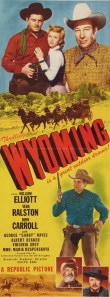 The last time I saw cowboy star Bill Elliott was in the Red Ryder movie Conquest of Cheyenne (1946), in which he was credited as “Wild” Bill Elliott.
The last time I saw cowboy star Bill Elliott was in the Red Ryder movie Conquest of Cheyenne (1946), in which he was credited as “Wild” Bill Elliott.
I missed the next picture he made, Plainsman and the Lady (1946), but in both that film and this one, he’s listed in the credits with the more mature moniker “William Elliott.”
Like Elliott’s name change, Wyoming reflects a B-grade product’s aspirations to A-level status.
It’s about halfway successful.
Director Joseph Kane knows how to shoot a western, and Wyoming looks great. It’s full of snowstorms, big cattle drives, and beautiful wide open spaces. Legendary stuntman Yakima Canutt is credited as the second unit director, and the fistfights, shootouts, and horse action are all well-done. (One fight in particular is more brutal than I ever expected from a Republic western.)
But the script by prolific screenwriters Lawrence Hazard and Gerald Geraghty never rises to A quality. It’s full of big ideas and grand themes, but the treatment of those themes is muddled, and the dialogue is hackneyed.
In Wyoming, Elliott plays Charles Alderson, an intrepid pioneer who settles in the territory of Wyoming with his pregnant wife. When she dies in childbirth, Alderson sends his daughter to Europe for an education. While she is away, he builds up an enormous cattle herd, and becomes rich. He does so with the help of his friend Thomas Jefferson “Windy” Gibson (George “Gabby” Hayes), a grizzled old mountain man who says that while he may not look it, he was originally a lawyer from Vermont. But he got too involved with another “bar.” Get it?
Alderson’s daughter Karen returns to Wyoming in 1890, soon after it has been admitted to the union. (Karen is played by Vera Ralston, who also played her own mother in the opening portion of the film.) Alderson is now a cattle baron, but all is not well. Much of his range is now open to homesteaders, who are led by John “Duke” Lassiter (Albert Dekker). Lassiter is a shady character who is involved in rustling cattle, and who is exploiting the homesteaders for his own purposes.
Alderson’s foreman, Glenn Forrester (John Carroll), cautions Alderson that resorting to violence will only make things worse, but Alderson is a prideful, tyrannical man who shoots first and thinks later.
If all of this sounds a lot like Howard Hawks’s Red River (which was filmed in 1946 but wasn’t released until 1948), that’s because it is. But Wyoming never achieves the same impact as Red River.
The biggest problem with Wyoming is Elliott himself. The character he plays, Charles Alderson, is a complicated man who is nearly undone by his own ambition and propensity for violence, but Elliott is not a nuanced actor. I loved him in the Red Ryder westerns because he was so wooden that it added to the comic-book stalwartness of the character, but in Wyoming he seems to be overreaching, and it’s a little like watching Leslie Nielsen play Othello.